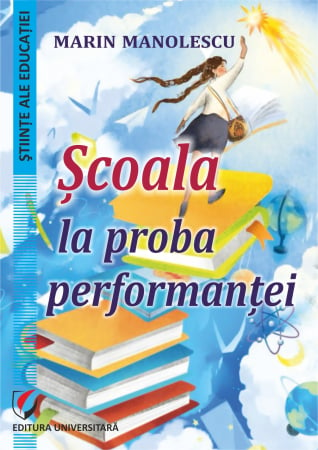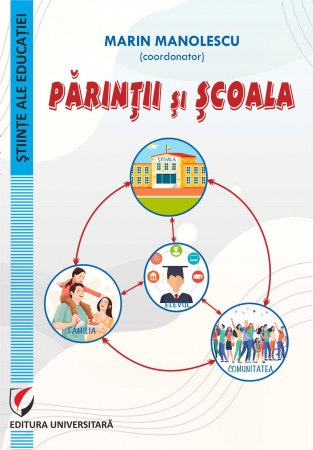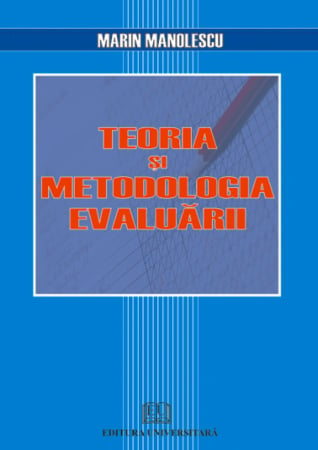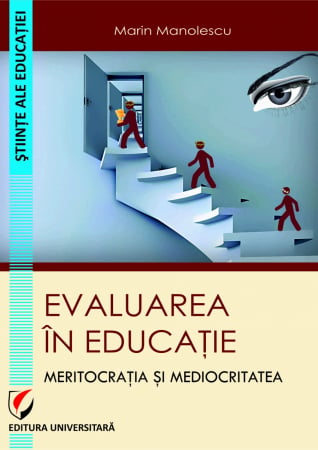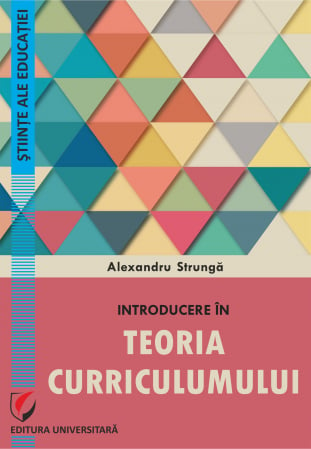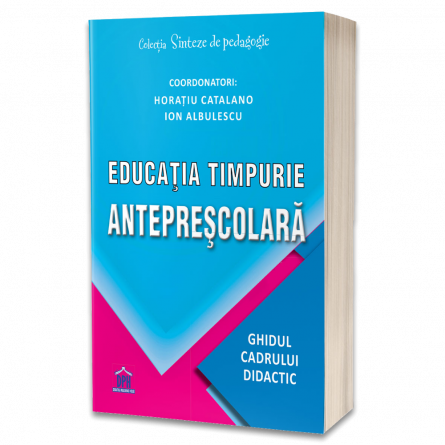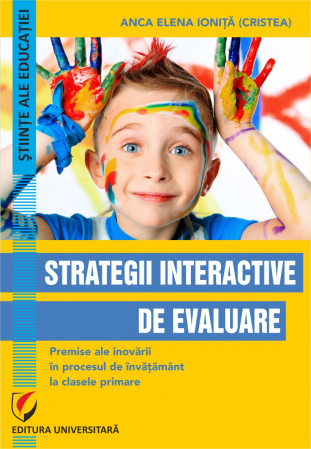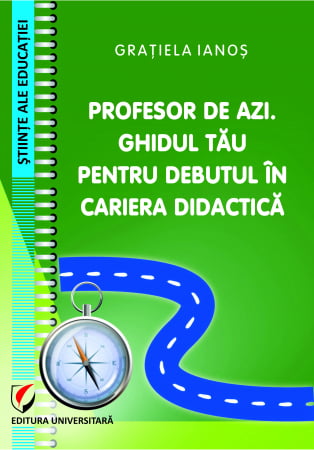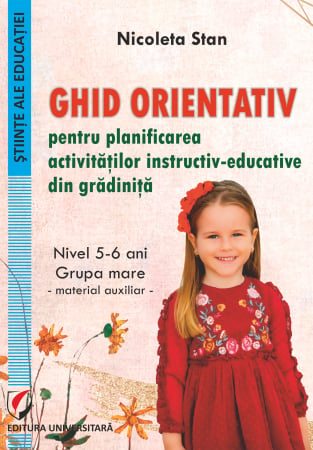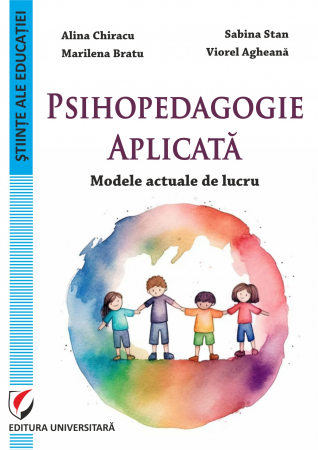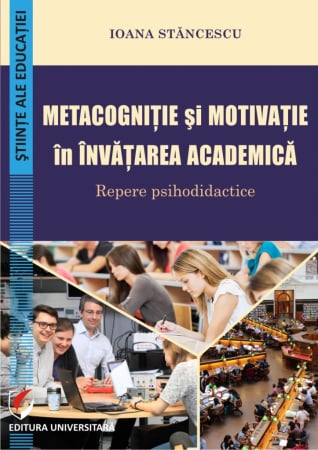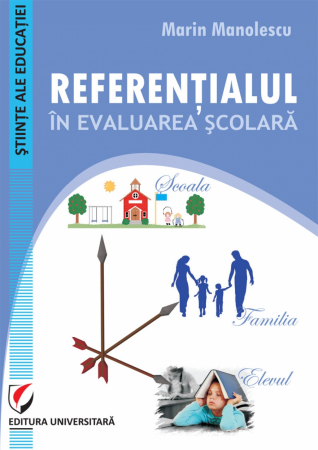Manuscript proposals: [email protected] / 0745 204 115 //// Tracking orders Individuals / Sales: 0745 200 357 / Orders Legal entities: 0721 722 783
6359.png) Educational connections beyond content. An applied perspective for teachers. Volume II - Cristina Tripon, Ana-Voichita Tebeanu, Iulia Gonta
Educational connections beyond content. An applied perspective for teachers. Volume II - Cristina Tripon, Ana-Voichita Tebeanu, Iulia Gonta
6359.png)
Publisher: Editura Universitară
Author: Cristina Tripon, Ana-Voichita Tebeanu, Iulia Gonta
Edition: I
Pages: 156
Publisher year: 2023
ISBN: 978-606-28-1653-7
DOI: https://doi.org/10.5682/9786062816537
Product Code:
9786062816537
Do you need help?
0745 200 357
- Description
- Download (1)
- Authors
- Content
- More details
- Reviews (0)
The approach of this educational vision is addressed to teachers who want to offer students high-quality experiences, to initiate original approaches and to fulfill themselves professionally.
The perspective offered in this work (volume II) aims to offer practical and innovative solutions to face the current challenges of the young generation in the digital world. It offers a holistic approach taking into account the new characteristics of young people, the social challenges faced by adolescents and the cognitive and behavioral strategies for effective learning.
Techniques and strategies are suggested to promote a stimulating learning atmosphere and to help students overcome obstacles in the learning process, discovering concrete ways to understand their own learning process, to monitor progress and develop self-regulation skills.
The perspective offered in this work (volume II) aims to offer practical and innovative solutions to face the current challenges of the young generation in the digital world. It offers a holistic approach taking into account the new characteristics of young people, the social challenges faced by adolescents and the cognitive and behavioral strategies for effective learning.
Techniques and strategies are suggested to promote a stimulating learning atmosphere and to help students overcome obstacles in the learning process, discovering concrete ways to understand their own learning process, to monitor progress and develop self-regulation skills.
-
Educational connections beyond content. An applied perspective for teachers. Volume II
Download
CRISTINA TRIPON
ANA-VOICHITA TEBEANU
IULIA GONTA
ANA-VOICHITA TEBEANU
IULIA GONTA
Argument / 7
The new characteristics of the young generation in response to the technological, economic and cultural changes of the world / 10
Summary / 10
Objectives / 10
The new bio-psycho-behavioural characteristics of generations Z and Alfa / 11
The specifics of the education accepted by the Alfa / 14 generation
Alpha generation - entrepreneurial generation / 16
Psychological resources regarding the personal development of the new generation / 17
Emotional intelligence as a resource for achievement / 20
Characteristics of the temporal perspective of adolescents and young people / 23
Risk assumption in situations of uncertainty / 26
Digital communication. Online dating / 28
Social challenges of teenagers: bullying, addictions, burnout, stress, procrastination / 31
Summary / 31
Objectives / 31
Introduction / 32
Dependencies / 32
Drug addiction / 34
Addiction to computer games / 35
Bullying / 36
Stress / 36
Anxiety and depression / 37
Burnout / 38
The body as an object of representations, promoted in social networks / 40
Sexualization of society / 41
Psychological characteristics in the phenomenon of procrastination / 43
Behavioral and social-cognitive approaches to learning / 44
Summary / 44
Objectives / 45
Defining a term we all know something about: learning / 45
Behavioral approaches to learning / 49
How are the principles of operant conditioning applied in education? From rats to humans / 58
Social-cognitive approaches to learning. A. Bandura / 88
Metacognition and self-regulation of learning / 105
Objectives / 106
What is metacognition and self-regulation of learning? / 106
What can be the characteristics of a self-regulating student? / 108
1. Teachers should acquire professional understanding of the competencies to develop metacognitive knowledge in their students / 113
2. Explicitly, teachers teach students metacognitive strategies, including how to plan, monitor and evaluate their learning / 117
3. Shaping teachers' own thinking to help students develop their metacognitive and cognitive skills / 123
4. Establishing an appropriate value of the challenge level to develop students' skills, self-control and metacognition / 127
5. Promotion and development of metacognitive conversation in class / 132
6. Explicitly teaching students how to organize and effectively manage their learning, independently, without support / 136
7. Schools should support teachers to develop metacognitive knowledge and expect them to be applied appropriately / 142
Bibliography / 146
The new characteristics of the young generation in response to the technological, economic and cultural changes of the world / 10
Summary / 10
Objectives / 10
The new bio-psycho-behavioural characteristics of generations Z and Alfa / 11
The specifics of the education accepted by the Alfa / 14 generation
Alpha generation - entrepreneurial generation / 16
Psychological resources regarding the personal development of the new generation / 17
Emotional intelligence as a resource for achievement / 20
Characteristics of the temporal perspective of adolescents and young people / 23
Risk assumption in situations of uncertainty / 26
Digital communication. Online dating / 28
Social challenges of teenagers: bullying, addictions, burnout, stress, procrastination / 31
Summary / 31
Objectives / 31
Introduction / 32
Dependencies / 32
Drug addiction / 34
Addiction to computer games / 35
Bullying / 36
Stress / 36
Anxiety and depression / 37
Burnout / 38
The body as an object of representations, promoted in social networks / 40
Sexualization of society / 41
Psychological characteristics in the phenomenon of procrastination / 43
Behavioral and social-cognitive approaches to learning / 44
Summary / 44
Objectives / 45
Defining a term we all know something about: learning / 45
Behavioral approaches to learning / 49
How are the principles of operant conditioning applied in education? From rats to humans / 58
Social-cognitive approaches to learning. A. Bandura / 88
Metacognition and self-regulation of learning / 105
Objectives / 106
What is metacognition and self-regulation of learning? / 106
What can be the characteristics of a self-regulating student? / 108
1. Teachers should acquire professional understanding of the competencies to develop metacognitive knowledge in their students / 113
2. Explicitly, teachers teach students metacognitive strategies, including how to plan, monitor and evaluate their learning / 117
3. Shaping teachers' own thinking to help students develop their metacognitive and cognitive skills / 123
4. Establishing an appropriate value of the challenge level to develop students' skills, self-control and metacognition / 127
5. Promotion and development of metacognitive conversation in class / 132
6. Explicitly teaching students how to organize and effectively manage their learning, independently, without support / 136
7. Schools should support teachers to develop metacognitive knowledge and expect them to be applied appropriately / 142
Bibliography / 146
Current learning seeks to meet the current needs of society and to create favorable conditions for the development of each personality, promotes diversity and creativity, mix of styles and tolerance of ambiguity, acceptance of innovation and change, provoking critical thinking and seeking new opportunities, creating reality through exchange of experience. Modern methodologies open up possibilities for people with different types of intelligence, call on alternative sources of information, allowing individualization of the learning process. This process proposes the determination by each person of his objectives, goals, ideals for achieving personal development, different from those of other people. These routes can be realized with the condition of self-knowledge and self-education, through a lot of individual work based on the additional sources predetermined by each student. Also, this process is based on knowing the psychological characteristics of the new generation, their expectations, needs, values and aspirations.
The guide offers a perspective of knowledge of the young generation, of the social challenges they face. It analyzes the impact of the new information technology revolution and the globalization of society on the new generations and on the communication and information path, on the educational interaction.
The behavioral and social-cognitive approaches to learning describe the characteristics of learning within the behavioral and cognitive approaches. By identifying and explaining the differences between classical conditioning and operant conditioning, readers will understand the processes and outcomes involved in how behaviors are formed and maintained. Also, various behavioral strategies are presented for increasing desirable behaviors and decreasing undesirable behaviors, offering educational professionals a set of useful tools for managing student behaviors.
By understanding the differences between direct learning and observational learning and how models can influence behaviors and attitudes, readers will be guided with essential elements to create a stimulating and inspirational learning environment in the classroom. Also here is described the concept of self-regulated learning and its importance in the development of self-instruction skills and self-direction of learning. Understanding ways to increase self-efficacy and specific self-teaching strategies will allow readers to support students in developing independent and effective learning skills. The theories and concepts presented in will help professionals to create an optimal learning environment, to stimulate students' motivation and commitment, but also to allow them to develop their learning skills and behavior management, both within the classroom and beyond.
It is known that if we "think well", then learning can take place. But how does this happen? What is the connection between thinking, learning and remembering? This book discusses the basics of these concepts. The science of learning is an extensive field that is based on research in disciplines such as psychology, education, neuroscience and even sociology and computer science. The guide offers seven practical, evidence-based recommendations to support teachers in developing metacognitive knowledge and cognitive skills in their students. The guide is relevant for practitioners from the first years of life, teachers and leaders or for those who deal with learning throughout life.
The hope that this collection of practical recommendations will bring clarity and guidance to an area of teaching and learning that holds so much promise but can be difficult to implement is one of the reasons for this book, providing a range of support materials for resources, tools and training courses to help with implementation.
The guide offers a perspective of knowledge of the young generation, of the social challenges they face. It analyzes the impact of the new information technology revolution and the globalization of society on the new generations and on the communication and information path, on the educational interaction.
The behavioral and social-cognitive approaches to learning describe the characteristics of learning within the behavioral and cognitive approaches. By identifying and explaining the differences between classical conditioning and operant conditioning, readers will understand the processes and outcomes involved in how behaviors are formed and maintained. Also, various behavioral strategies are presented for increasing desirable behaviors and decreasing undesirable behaviors, offering educational professionals a set of useful tools for managing student behaviors.
By understanding the differences between direct learning and observational learning and how models can influence behaviors and attitudes, readers will be guided with essential elements to create a stimulating and inspirational learning environment in the classroom. Also here is described the concept of self-regulated learning and its importance in the development of self-instruction skills and self-direction of learning. Understanding ways to increase self-efficacy and specific self-teaching strategies will allow readers to support students in developing independent and effective learning skills. The theories and concepts presented in will help professionals to create an optimal learning environment, to stimulate students' motivation and commitment, but also to allow them to develop their learning skills and behavior management, both within the classroom and beyond.
It is known that if we "think well", then learning can take place. But how does this happen? What is the connection between thinking, learning and remembering? This book discusses the basics of these concepts. The science of learning is an extensive field that is based on research in disciplines such as psychology, education, neuroscience and even sociology and computer science. The guide offers seven practical, evidence-based recommendations to support teachers in developing metacognitive knowledge and cognitive skills in their students. The guide is relevant for practitioners from the first years of life, teachers and leaders or for those who deal with learning throughout life.
The hope that this collection of practical recommendations will bring clarity and guidance to an area of teaching and learning that holds so much promise but can be difficult to implement is one of the reasons for this book, providing a range of support materials for resources, tools and training courses to help with implementation.
If you want to express your opinion about this product you can add a review.
write a review

![Educational connections beyond content. An applied perspective for teachers. Volume II - Cristina Tripon, Ana-Voichita Tebeanu, Iulia Gonta [1] Educational connections beyond content. An applied perspective for teachers. Volume II - Cristina Tripon, Ana-Voichita Tebeanu, Iulia Gonta [1]](https://gomagcdn.ro/domains/editurauniversitara.ro/files/product/large/conexiuni-educationale-dincolo-de-continut-o-perspectiva-aplicativa-pentru-profesori-volumul-ii-752523.jpg)
